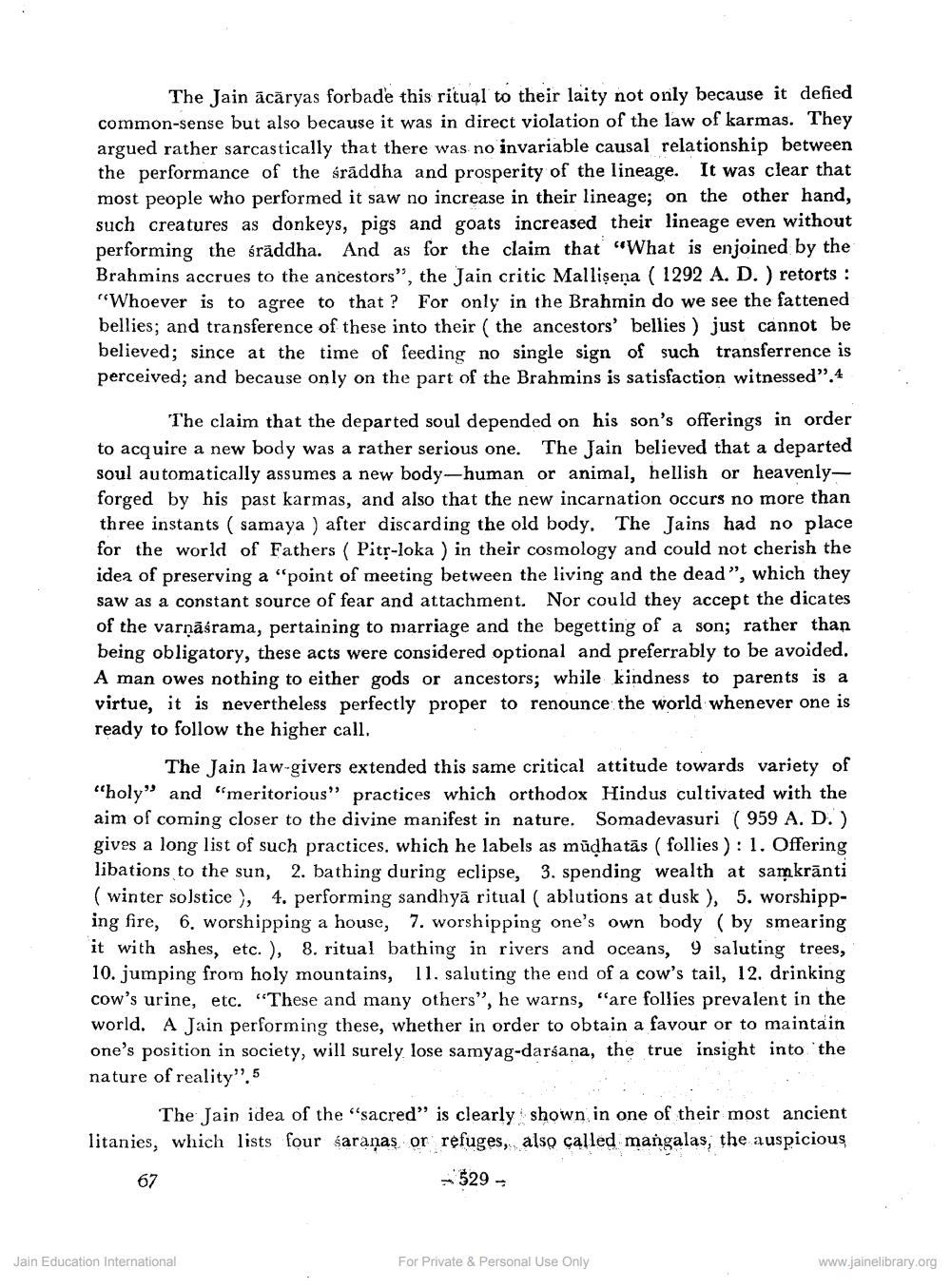Book Title: Jain Concept of The Sacred Author(s): Padmanabh S Jaini Publisher: Z_Kailashchandra_Shastri_Abhinandan_Granth_012048.pdf View full book textPage 6
________________ The Jain ācāryas forbade this ritual to their laity not only because it defied common-sense but also because it was in direct violation of the law of karmas. They argued rather sarcastically that there was no invariable causal relationship between the performance of the srāddha and prosperity of the lineage. It was clear that most people who performed it saw no increase in their lineage; on the other hand, such creatures as donkeys, pigs and goats increased their lineage even without performing the sråddha. And as for the claim that “What is enjoined by the Brahmins accrues to the ancestors", the Jain critic Mallisena ( 1292 A. D. ) retorts : "Whoever is to agree to that ? For only in the Brahmin do we see the fattened bellies; and transference of these into their ( the ancestors' bellies) just cannot be believed; since at the time of feeding no single sign of such transferrence is perceived; and because only on the part of the Brahmins is satisfaction witnessed”.4 The claim that the departed soul depended on his son's offerings in order to acquire a new body was a rather serious one. The Jain believed that a departed soul automatically assumes a new body-human or animal, hellish or heavenlyforged by his past karmas, and also that the new incarnation occurs no more than three instants ( samaya ) after discarding the old body. The Jains had no place for the world of Fathers ( Pitp-loka ) in their cosmology and could not cherish the idea of preserving a "point of meeting between the living and the dead”, which they saw as a constant source of fear and attachment. Nor could they accept the dicates of the varṇāśrama, pertaining to marriage and the begetting of a son; rather than being obligatory, these acts were considered optional and preferrably to be avoided. A man owes nothing to either gods or ancestors; while kindness to parents is a virtue, it is nevertheless perfectly proper to renounce the world whenever one is ready to follow the higher call. The Jain law-givers extended this same critical attitude towards variety of "holy" and "meritorious" practices which orthodox Hindus cultivated with the aim of coming closer to the divine manifest in nature. Somadevasuri (959 A. D.) gives a long list of such practices, which he labels as mūdhatās (follies): 1. Offering libations to the sun, 2. bathing during eclipse, 3. spending wealth at samkrānti ( winter solstice), 4. performing sandhyā ritual ( ablutions at dusk ), 5. worshipping fire, 6. worshipping a house, 7. worshipping one's own body ( by smearing it with ashes, etc.), 8. ritual bathing in rivers and oceans, 9 saluting trees, 10. jumping from holy mountains, 11. saluting the end of a cow's tail, 12. drinking cow's urine, etc. “These and many others”, he warns, "are follies prevalent in the world. A Jain performing these, whether in order to obtain a favour or to maintain one's position in society, will surely lose samyag-darsana, the true insight into the nature of reality'.5 The Jain idea of the “sacred” is clearly shown in one of their most ancient litanies, which lists four saraņas or refuges, also called mangalas, the auspicious 529 - 67 Jain Education International For Private & Personal Use Only www.jainelibrary.orgPage Navigation
1 ... 4 5 6 7 8 9 10
